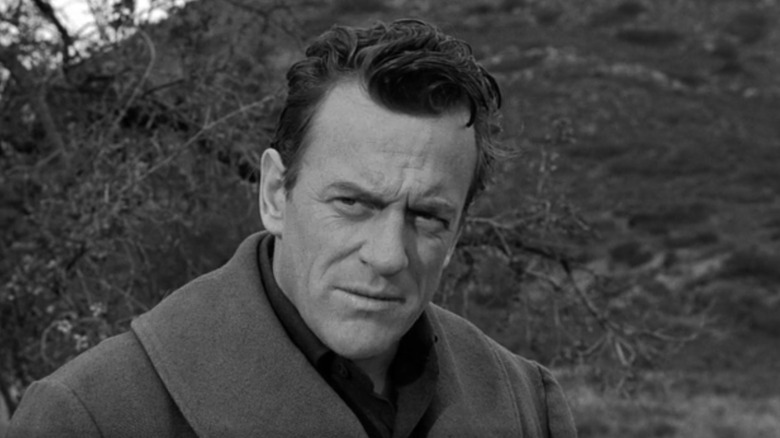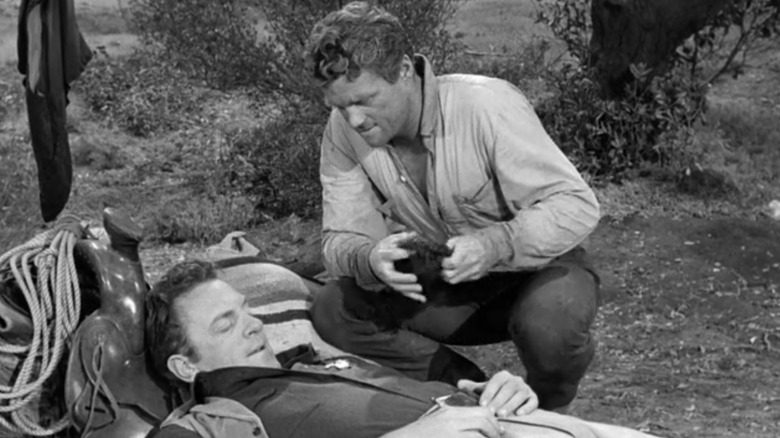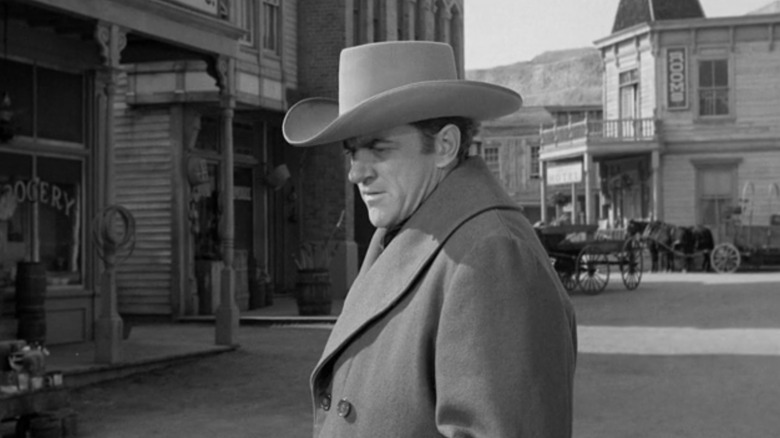The Best Episode Of Gunsmoke, According To IMDB
Television westerns often skewed toward a younger demographic with the likes of kid-friendly cowboy figures like "Roy Rogers" and "Hopalong Cassidy." Audiences were conditioned to see more adult westerns on the big screen. But everything changed on September 10, 1955 when famed movie star John Wayne introduced viewers to a television western series with a more mature bent: "Gunsmoke." The CBS period drama became a smash hit sensation, which not only garnered a then-record breaking 20 seasons, but paved the path for shows like "Bonanza," "Rawhide," and "The Wild Wild West"
Plenty of things changed on "Gunsmoke" over its two-decade span on the air, but the one constant throughout its entire run was the viability of its lead star. James Arness would appear in just about every episode as Marshal Matt Dillon, the lawman of Dodge City, Kansas who often found himself in all sorts of confrontations that he would be tasked with resolving. Although Arness initially doubted his acting skills during the beginning of the series, he grew into the role and it would essentially define his career.
The ratings on a series' IMDb page doesn't always hold much critical weight, as they can often be tampered with by users orchestrating campaigns to sway it either way, whether they've actually seen the show or not. In this case, it stands to chance that the IMDb ratings for "Gunsmoke" are slightly more trustworthy given that it appeals to an older demographic. If you're looking to watch the series' best episodes, you have a long journey ahead of you. After all, "Gunsmoke" has over 635 adventures to its name, in addition to five television movies. That's a lot to sift through. At the top of the board, however, is a truly great episode that presents Marshal Dillon with one of his greatest moral dilemmas.
The Gallows is the highest-rated Gunsmoke episode with a 9.2 rating
It's not uncommon for Marshal Dillon to bring people to justice, but the season 7 episode entitled "The Gallows" actually makes our procedural hero question the very system he's meant to uphold.
A drifter named Pruitt Dover (Jeremy Slate) arrives in Dodge City with a wagon full of supplies, having hauled it all the way down from Santa Fe, New Mexico. Ax Parsons (Robert J. Stevenson), the client who orchestrated the order, had promised Pruitt that he'd pay him $100 for the trip, but claims he doesn't have the money yet. There's tension in the air, but Pruitt agrees to wait until he does. The two end up drinking together, but things take a turn for the worse when the alcoholic Parsons reveals he likely won't have the $100. Pruitt and Parsons end up getting into a fight and knocking over a lamp in their drunken stupor. Pruitt wakes up the next morning to discover a knife lodged in Parsons' chest, prompting him to leave town.
Marshal Dillon, naturally, is responsible for bringing Pruitt back to Dodge City for a trial. It turns out the accused didn't really make an attempt to hide from the law. The pair seem to understand one another. Dillon even goes so far as to forgo Pruitt's shackles while they're riding. An outside inevitability, however, sends them off course, which usually tends to happen whenever Dillon transports prisoners. A local hillbilly (William Challee) trying to stick them up presents Pruitt with the perfect excuse for a getaway. But rather than letting his captor succumb to his gunshot wound, Pruitt fights back and, rather ironically, ends up stabbing the robber in the chest.
"The Gallows" is mostly relegated to Arness and Slate as two men who find themselves challenging their expectations. Every time Pruitt seems like he could easily leave Dillon behind, he actually ends up coming back with food or medical supplies. He's an honest man, which only makes the next part of their journey that much more difficult to bear.
Marshal Dillon grapples with his own guilt
Over the course of "Gunsmoke," Marshal Dillon is presented as a fair-minded individual, a rare trait among law enforcement, and a guy who would rather resolve things peacefully than pull out his six-shooter. "The Gallows" pushes his empathy even further, going so far as to present his prisoner with numerous opportunities to escape. Pruitt refuses to do so on account of not wanting to look over his shoulder for the rest of his life, in addition to not wanting to put Dillon's job in jeopardy. They're able to see each other as human beings.
Pruitt's good behavior compels the Marshal to argue an impassioned plea on his behalf in court. An antagonistic judge (Joseph Ruskin), however, finds him guilty of murder with no evidence to support his claim. It feels especially infuriating because the onus of proving guilt is the responsibility of the prosecution and there was plenty of doubt to be cast as to whether Pruitt was responsible. All signs point to no, but it's off to the gallows for Pruitt anyway. It's easier to just be rid of him than to spend the time ensuring the legitimacy of his case.
Every week, Dillon is presented as a figurehead of law and order, but it's in the episode's final few minutes where "Gunsmoke" makes him question his place. In this moment, the Marshal recognizes his standing as an arm of a broken legal system that has sent an innocent man to die, especially one so resigned to his unjustified fate. It's a solemn, bleak ending that fills our main character with so much shame that even the camera can't bear to look at what he's wrought. Despite every opportunity to give Pruitt a fair shake, the law failed him at every turn. It's no wonder this is considered one of the more revered episodes of "Gunsmoke."
Every episode of "Gunsmoke" is currently streaming on Pluto TV.


